The Spread examines the political nature of Star Trek by shining a light on some of the Anti-Brexit themes which have emerged from the Simon Pegg co-penned sequel Star Trek Beyond.
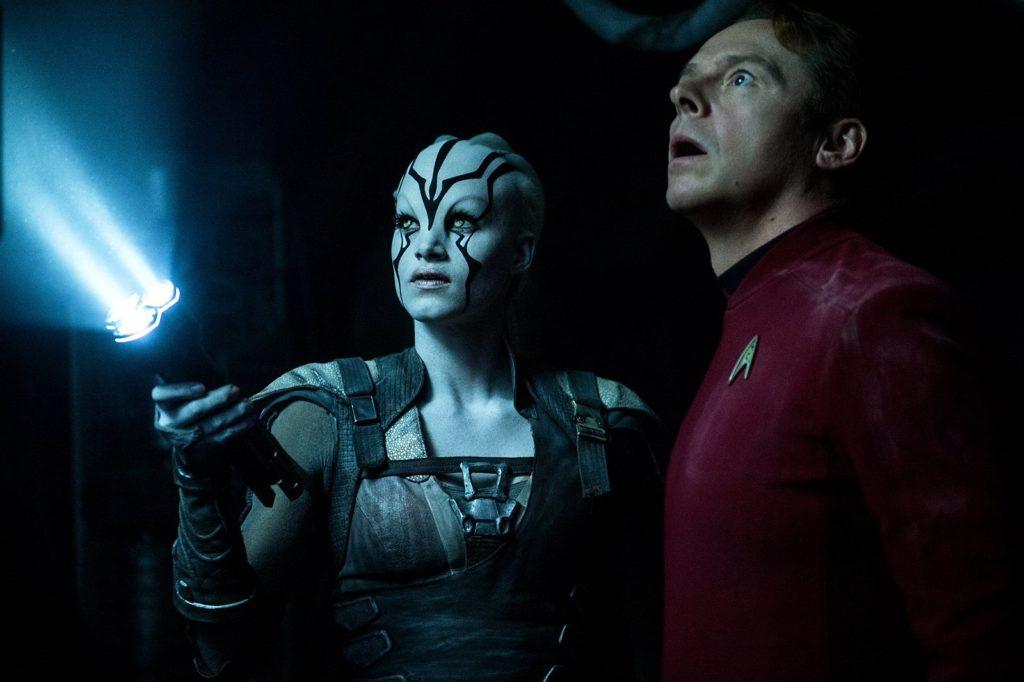
Of all the politically conscious American blockbusters of 2016 that center around the theme of division, of which there are many, Star Trek Beyond stands apart from the rest because of, if nothing else, its hopeful tone.
Star Trek has always been a politically charged property during both its small and big screen iterations but it’s developed a reputation for topicality over the decades, from the first passionate interracial kiss on American television in 1968 (seven months after the assassination of Martin Luther King Jr. and the following riots) to a metaphorical breakdown of the breakdown of the Soviet Union in Star Trek VI: The Undiscovered Country in 1991 (a matter of weeks before the Soviet Union officially dissolved). “The Undiscovered Country” of course being a reference to the concept of the future; a frightening, but exhilarating, unknown.
Star Trek, operating as a mostly American enterprise in both an objective and ideological sense, was dealing with what to do in the face of victory back then. As a long running narrative, the antagonists of Star Trek’s universe are not only ultimately overcome but, in line with the core aesthetic of original creator Gene Roddenberry, ultimately assimilated into the progressive collective known as The United Federation of Planets. Star Trek Beyond, on the other hand, (and this is what really sets it apart from other action franchises of Hollywood that were apprehensively awaiting a shift in the political winds, unsure of exactly which direction things would go) deals with what to do in the event of straight defeat.
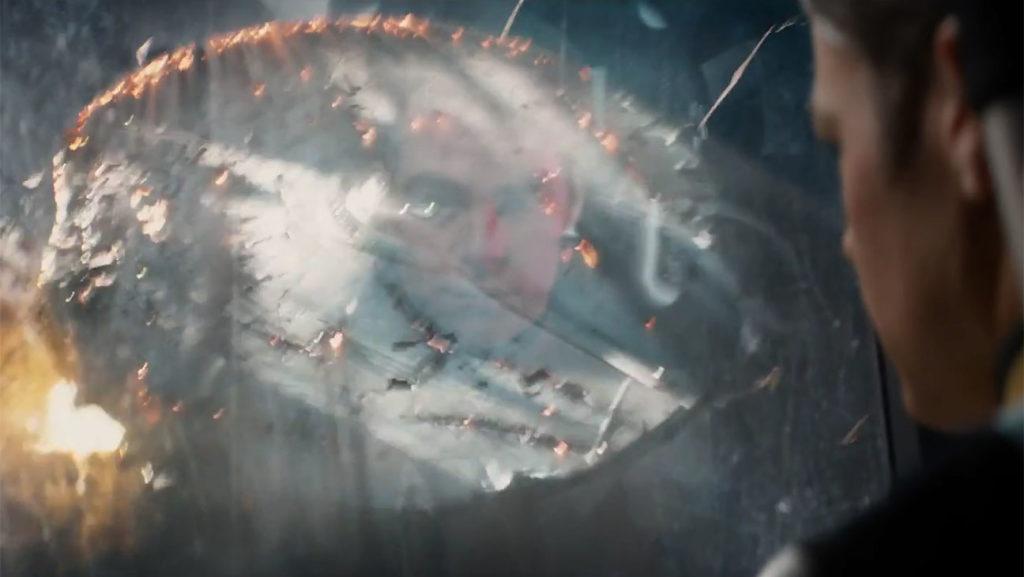
Purely from a storytelling perspective, it’s quite interesting. Usually a hero’s failure, at least in Western storytelling, stems from an act of hubris. The crew of the Enterprise, however, do everything right. They act altruistically, they stick together, follow protocol to a T and improvise accordingly when things go bad but they still lose.
It’s important to point out at this juncture that Star Trek Beyond, just like the other aforementioned political blockbusters of the year, was not a reaction to political events of 2016 purely because it couldn’t be. In order to be released almost exactly one month after the Brexit vote in the UK, the film had to begin principal photography almost exactly one year before it.
This isn’t to say that Brexit wouldn’t have been on the mind of co-writer, and cast member, Simon Pegg when the film was being written, or filmed for that matter (with the Conservative party gaining a majority in the General Election held about one month before principal photography began and guaranteeing the referendum), because, for starters, it’s difficult for any creative to detach themselves from the reality they live in but also because a lot of themes that we’re going to go on to look at (like loss of identity and the infiltration of robotic technology into global affairs) were already quite prevalent in mainstream screenwriting by that point.
Nor is this to discount the work of Star Trek Beyond’s other credited screenwriter Doug Jung, but Pegg’s involvement raises a fascinating subtext in the film that offers the same amount of meaning whether it was intentional or entirely coincidental.
The theme of division, most accurately described as “breaking up” within Star Trek Beyond, is fairly clear (from the villain’s motivations to Spock and Kirk separately, and simultaneously, planning to leave the Federation’s “Starfleet”). What’s less apparent, and far more interesting, is the political imagery and wording that surrounds that theme.
To begin with, there’s Pegg’s physical presence in the story itself as Montgomery Scott; an integral part of the original Star Trek lineup and a distinctly proud Scot, worth noting because the major political event which had happened just prior to Pegg taking on screenwriting duties in the wake of a shakeup in late 2014 was another referendum vote on Scottish independence.
“There is strength in unity”
It falls to Scotty to give the film’s main motivational, soapbox, speech on the matter of unity; convincing the skeptical character, and spiritual center of the film, Jaylah with the parable of “my wee granny used to say that you cannae break a stick in a bundle”. But the most interesting talking point of the film, regarding its political subtext, is its villain; Idris Elba’s Krall.
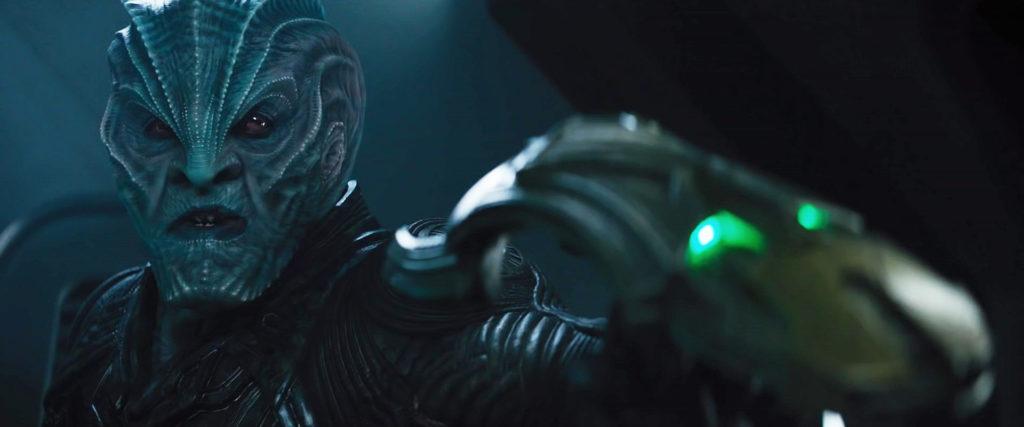
From a cursory glance there’s not that much new about Krall as a Star Trek villain, rather its the way in which information about his character is revealed throughout the film that makes him so noteworthy. Krall is introduced into the story as a literal monster, hunched and inhuman, snarling at a group of heroes who he considers invaders. “Federation is an act of war” he barks at Zoe Saldana’s Uhura as she begins to understand his inexplicable grasp of Starfleet and the English language. When the film reaches its climax, it’s revealed that Krall is not only human but was in fact once a Captain of Starfleet himself. Despite various speeches throughout the film about his belief in the necessity for struggle, his grievance isn’t really born out of an opposition to the ethos of the Federation but rather what Pegg describes as “sour grapes”.
Krall’s motivation stems from a need for revenge because he was, as Pegg puts it, “left behind” by the system that he’s attempting to destroy; akin to the so-called Baby Boomer generation, so often blamed entirely for unpopular voting habits, born out of war and struggling to find meaning and survival in times of austerity from a government which they became dependent on. The way in which the film allows his character to unfold is representative of the film’s best quality, from a political standpoint, because, unlike most other political narratives of that time period, it focuses on the idea of disenfranchisement.
The world that I was born into was very different from yours, lieutenant. We knew pain, we knew terror. Struggle made us strong. Not peace, not unity. These are myths the Federation would have you believe.
Krall doesn’t really have a master plan in the film, he doesn’t really believe that what he’s doing is for the best, he’s simply latched onto an extreme perversion of his own identity in order to survive. As the film progresses, Krall physically appears more and more human due to a story device before being fully unmasked, as it were. The film, quite literally, humanizes the character of the hateful troll commanding an army of bots to strike at the heart of the establishment.
The theme of small things banding together to defeat larger opponents is set up from the opening scene, in which Kirk is overpowered by a swarm of distrustful and comically small aliens, and then echoed again in the film’s key action sequences. From Krall’s initial, successful, attack on the Enterprise using a swarm of drone ships to the raiding of Krall’s camp with a holographic projector that makes Kirk appear in numerous locations simultaneously and then again in the final confrontation with Krall’s drone ships where they’re defeated by the Enterprise crew banding together and showing their power of collective, diverse, thinking.
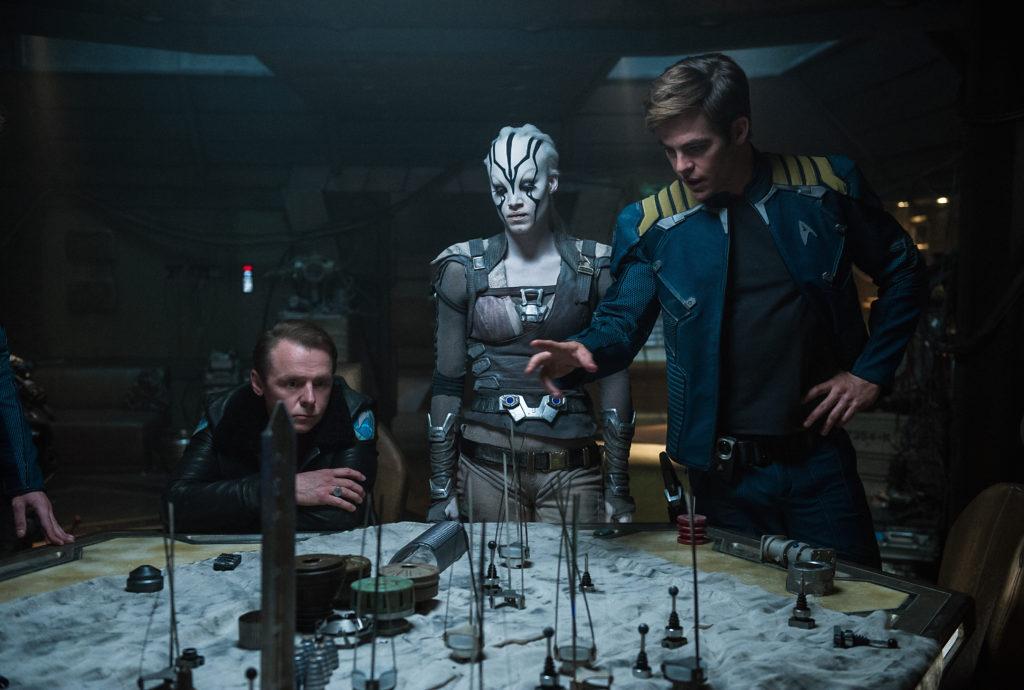
I’m not going to go speculate on the effects of Russian disinformation campaigns and social media on democracy in the West because, for one thing, an analytical reading of the third film in a rebooted science-fiction franchise based on a sixties TV show simply isn’t the correct forum but the idea of an embodiment of the establishment itself (the flagship of the galaxy’s largest group) being completely destroyed in a surprise attack perpetrated by what appears to be a huge foreign invader, but really turns out to be a small reactionary group using technology to make themselves appear to be larger than they actually are, is undeniably quite a striking image in a politically charged film from the Brexit vote time period.
It bears mentioning that all of this subtext is applicable to the Trump presidential campaign sentiments which were affecting the United States at this time also. Pro-Brexit and Pro-Trump campaigners often used identical rhetoric and public faces (Trump not only met with the public face of the Leave campaign, Nigel Farage, for photo opportunities but also attempted to get the nickname “Mr Brexit” going for himself at one point).
However, aside from Pegg stating in interview that the Federation is “essentially a similar organization [to the European Union], a group of disparate territories trying to work together to make something better. I think the entire Star Trek crew probably would have voted Remain”, the film does have a certain British feel to parts of it beyond some of the casting choices and Pegg’s unmistakable humour permeating into the script (there’s a deep cut reference to Spaced in there for all you superfans). After Spock quotes Shakespeare (another recognisable link to The Undiscovered Country) to spur on that Dunkirk spirit just before the characters start to turn things around (“The miserable have no medicine but only hope”) the film has another, quite definitely unintentional, link to Brexit discourse contained within its final battle sequence.
In order to defeat Krall’s swarm of drones, the Enterprise crew improvises a plan of action, in true Star Trek style, to defeat the swarm with a rebellious act of technological disruption which involves blasting The Beastie Boys’ hit “Sabotage” out into the subspace frequencies to disorientate the signal controlling the drones.
The Daily Mail would eventually create the defining image of the word’s usage in the discourse surrounding Brexit in 2017 with the headline “CRUSH THE SABOTEURS”, in reference to British citizens acting to impede the UK’s divorce process from the EU, but the word was, as evidenced by the headline, already circulating as a buzz term of resistance against Brexit.
Of course, as most of the last few examples demonstrate (the use of “Sabotage” bears a direct connection to JJ Abrams’ first film in the series), Star Trek Beyond is one type of film above being a political film about Brexit, or anything else for that matter, and that is a Star Trek film.
As I’ve pointed out, the film has a number of striking similarities to Nicholas Meyer’s Star Trek VI: The Undiscovered Country but also has a number of references and echoes to the original television series and Roddenberry’s overall vision for the property as well as, particularly, the third film from the original Star Trek cast: Leonard Nimoy’s Star Trek III: The Search for Spock (from the destruction of the Enterprise NCC-1701, resulting in the construction of the Enterprise NCC-1701-A, to the cathartic pairing of the usually adversarial characters of Spock and McCoy).
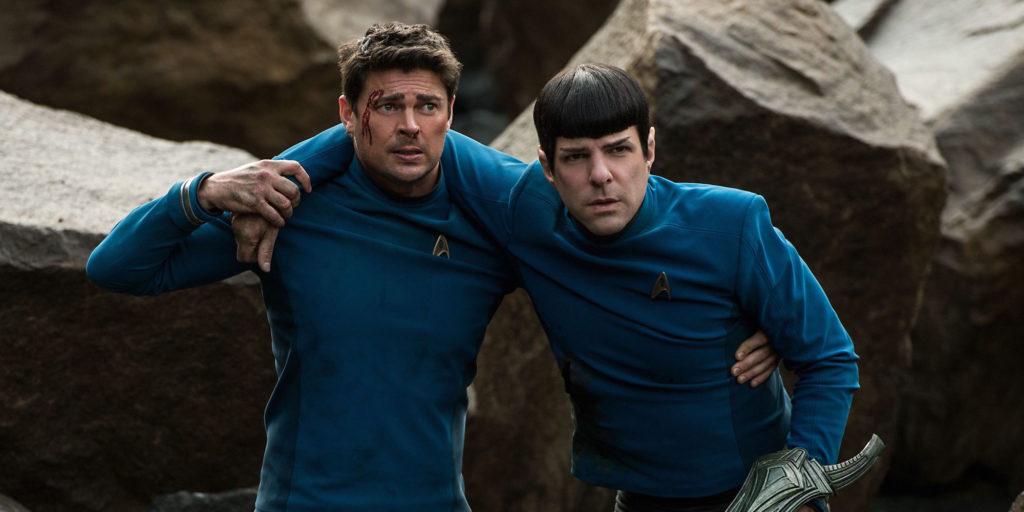
The “beyond” in Star Trek Beyond’s title of course referencing the future and the unknown in general, as The Undiscovered Country did, but also the future of Star Trek itself. Not only was Star Trek Beyond released in the year of Star Trek’s fiftieth anniversary, it was also the first film, or episode, to be released in the Star Trek canon after the death of Leonard Nimoy who was, for all intents and purposes, the heart and soul of Star Trek itself after Roddenberry’s death.
As Zachary Quinto’s Spock stares out into the infinite expanse of space, his character having just discovered the death of Nimoy’s version of the character (if you don’t know how the complicated timeline works in these films then it would take too long to explain here [it involves time travel]) which makes both the character and the actor portraying him the one and only Spock now, words from Captain Kirk’s opening log entry spring back to mind: “The farther out we go the more I find myself wondering what it is we’re trying to accomplish. If the universe is truly endless then are we not striving for something forever out of reach?”.
The film serves as a reaffirmation of faith in not just the idea of Star Trek but the ideas behind it, the most fitting example being the representation of the Federation, and its Anti-Brexit echoing philosophy, which the protagonists fight to save: the space station Yorktown. Yorktown was not only the original name of the ship which would end up being called the Enterprise in Roddenberry’s original concept for Star Trek but it visually serves as a representation of Roddenberry’s social beliefs and the image which Pro-Brexit campaigners rallied against. That being the multicultural metropolis (Disney’s 2016 film Zootopia provides a similar insight into this representation of constructed utopia and its political meaning within that time period).
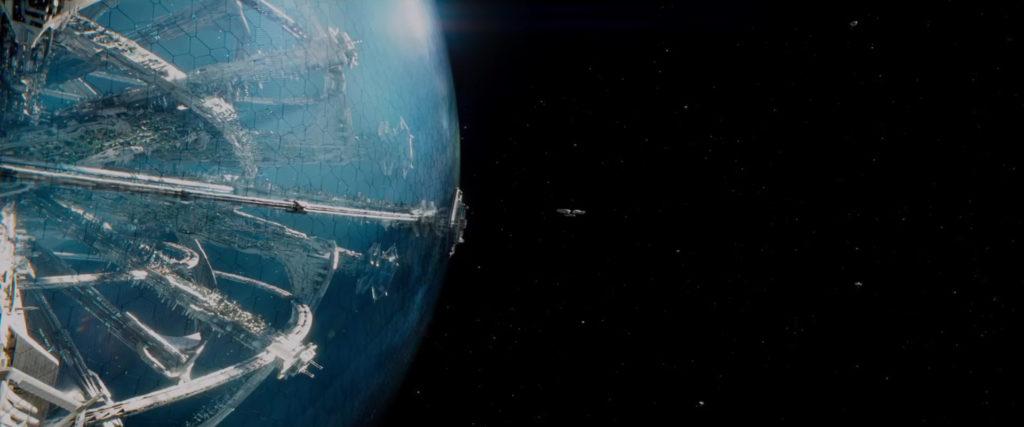
As a result, Star Trek Beyond serves as the first entry in Anglo-American political Hollywood discourse to focus on rebuilding a strong liberal establishment rather than reeling from, and lamenting, its demise. Another large scale, Hollywood produced, blockbuster which insinuated that perhaps there’s nothing that wrong with the system, and that all it really needs to do is pick itself up and believe in its fundamental principles to keep growing and changing, wouldn’t really come about until Zack Snyder and Joss Whedon’s Justice League in late 2017.
Much like The Undiscovered Country’s production, being reworked after the initial pitch to reboot the films to the storyline they follow now resulting in the film only wrapping principal photography a few months before it was released, Star Trek Beyond’s topicality was most likely the result of the time constraints placed on it. The project itself was, as mentioned earlier, the product of a bit of a reshuffle. The film was initially slated to be written and directed by former writer for the series, and still producer, Roberto Orci before he was dropped to make way for Pegg and Jung to begin writing the script in January 2015 for the film which would begin shooting in June.
Again, not to take away from Doug Jung’s contributions to the screenplay (his experience in writing for TV almost certainly came in very handy for obvious reasons) but it’s very easy to see Pegg’s personality in the film’s writing and Star Trek Beyond is a very accomplished screenplay in the same spirit of the screenplays Pegg wrote with his longtime writing partner Edgar Wright; introducing and reincorporating distinct themes throughout the film’s story.
With script rejections and rewrites going right down to the wire, Star Trek Beyond was always going to end up being a reflection of the time period in which it was made and that deep resonance with contemporary political and social issues is what makes it a true Trek experience.


